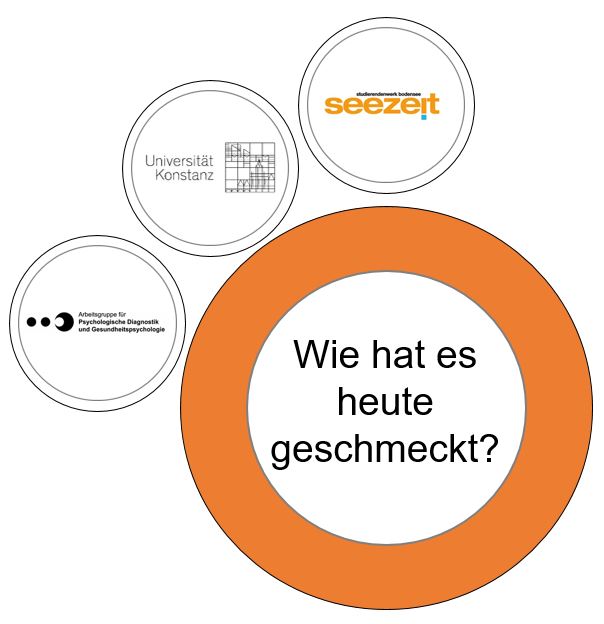![[Translate to Englisch:] Einkäufe werden mit dem Rad transportiert](/fileadmin/_processed_/3/1/csm_Einkauf_Rad_8c2f5abfb4.jpg)
Research on sustainable nutrition
Using various study designs, we would like to show ways of integrating sustainable eating behaviour into everyday life from a psychological perspective.
Within the framework of research projects, as co-operations with external partners or as final theses, we carry out studies with various designs in the highly relevant field of sustainable nutrition.

Survey in the University of Konstanz canteen
In 2020, we conducted a survey in the University of Konstanz canteen in cooperation with SEEZEIT Studierendenwerk Bodensee.
From the press release of the University of Konstanz from 27.11.2023: In the study, a total of over 5,000 canteen customers rated the sustainability and healthiness of 29 different meal options. In addition, precise values for environmental sustainability and health were determined by analysing the exact recipes of the meals using a special algorithm. The results clearly show that many participants automatically considered healthy food to be sustainable.
"Interestingly, however, there was no systematic correlation between this perception and the actual correlation between the sustainability and health values of the meals," says Gudrun Sproesser. This is because healthier meals can also be produced in a less environmentally friendly way and, conversely, sustainable food can be less beneficial to health.
The study was funded by the German Research Foundation (DFG) as part of the project "Collective Appetite" of the Cluster of Excellence Collective Behaviour at the University of Konstanz (2117- 422037984; PI Britta Renner) and the project "Why people eat in a traditional or modern way: A cross-country study" (1610/2-1, PI Gudrun Sproesser).
Sproesser, G., Arens-Azevedo, U., & Renner, B. (2023). The “healthy = sustainable” heuristic: Do meal or individual characteristics affect the association between perceived sustainability and healthiness of meals? PLOS Sustainability and Transformation, 2(11), e0000086. https://doi.org/10.1371/journal.pstr.0000086

Rescue box against food waste
The KErn – Kompetenzzentrum für Ernährung produced a "rescue box" - „Retterbox“ - against food waste to distribute in selected municipalities in Bavaria as part of the nationwide campaign week against food waste at the end of September 2022.
The Renner working group accompanied this pilot project in the form of an effectiveness evaluation. Participants in the campaign took part in an online survey before, during and after using the rescue boxes.
In addition to the scientific evaluation of the effectiveness of such a measure, the results were also used to further develop the content and communication materials of the box to suit the target group. The results of the pilot project can be found in the 7-8/2024 issue of ‘Schule und Beratung, Fachinformationen aus der Landwirtschaftsverwaltung in Bayern’ published by the Bavarian State Ministry of Food, Agriculture, Forestry and Tourism.
![[Translate to Englisch:] Logo der Zuckerstudie](/fileadmin/psychologie/ag-renner/Logos_Projekte/sugar_study.jpg)
The sugar study
This study investigated whether a nudging-based intervention could reduce sugar consumption in a habitual daily behaviour such as sweetening coffee. As the results show, a 20% reduction in sugar consumption was achieved by halving the volume poured.
Villinger, K., Wahl, D., Engel, K., Renner, B. (2021). Nudging sugar portions: a real-world experiment. BMC Nutr 7, 65. https://doi.org/10.1186/s40795-021-00473-9
![[Translate to Englisch:] Logo der Trinkwasser-Studie](/fileadmin/psychologie/ag-renner/Logos_Projekte/trinkwasser.jpg)
Drinking water study
Despite significant price differences, environmental concerns and strictly controlled tap water quality in most industrialised countries, bottled water consumption has increased significantly in recent years. To explore the factors associated with this shift in consumption in more detail, we used online surveys and tasting experiments to investigate how health and risk concerns as well as hedonistic and convenience factors differ between consumer groups in Germany.
Debbeler, L. J., Gamp, M., Blumenschein, M., Keim, D. A., & Renner, B. (2018). Polarized but illusory beliefs about tap and bottled water: A product- and consumer-oriented survey and blind tasting experiment. Science of the Total Environment, 643, 1400-1410. Advance online publication. doi: https://doi.org/10.1016/j.scitotenv.2018.06.190
